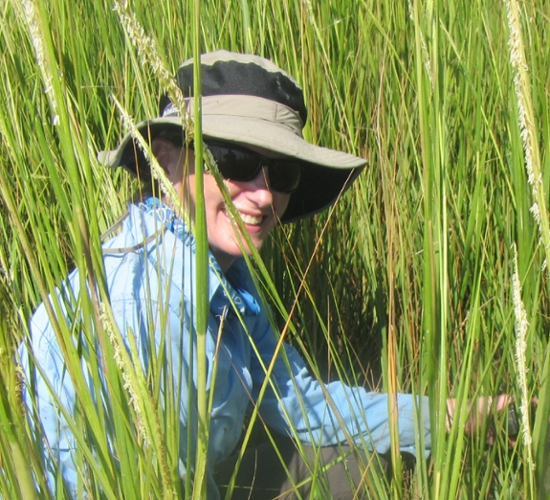B.S. Marine Biology, University of California Los Angeles, 1995
Anna R. Armitage
Professor and Interim Department Head
Department of Marine Biology

Learn more about Anna R. Armitage
- Get To Know
Anna R. Armitage
What in your life drew you to your current field of study?
Coastal wetlands hold countless hidden treasures that have drawn me towards this field of research. There are many animals that rely on wetlands for part of all of their life cycle. Commercial and recreational fishing industries and birdwatching ecotourism rely on wetlands as habitat for their species of interest. The plants in wetlands filter the water and remove pollutants, making the water cleaner and safer downstream for humans and wildlife alike. Wetlands protect shorelines and absorb floodwaters, helping to protect nearby neighborhoods.
What do you hope your students gain from studying or working with you?
Wetlands provide us with many benefits, from unique wildlife, to cleaner water, to safer urban communities. I hope that my students will make discoveries that will help us understand how to conserve, manage, and appreciate these gifts. My students will conduct work that will support science-based decision making to help protect these valuable resources.
What are you passionate about in your personal life?
I have had a deep personal connection to nature for as long as I can remember, and that is reflected in my professional and personal life. My weekends are often spent volunteering at local wetland restoration projects, tending my vegetable garden, or hiking and birdwatching in local parks. I seek to instill an appreciation for nature in my children and my community.
- Education
Ph.D. Biology, University of California Los Angeles, 2003
B.S. Marine Biology, University of California Los Angeles, 1995 - Courses Taught
MARB 430: Coastal Plant Ecology
MARB 482: Seminar: Science Communication
MARB 610: Professional Development - Publications
Guo, H., C.A. Weaver, S. Charles, A. Whitt, S. Dastidar, P. D'Odorico, J. Fuentes, J. Kominoski, A.R. Armitage, S.C. Pennings. 2017. Coastal regime shifts: rapid responses of coastal wetlands to changes in mangrove cover. Ecology 98: 762-772, doi: 10.1002/ecy.1698
Figlus, J., J.M. Sigren, M.J. Power, and A.R. Armitage. 2017. Physical model experiment investigating interactions between different dune vegetation and morphology changes under wave impact. Pages 470-480 in Proceedings of Coastal Dynamics 2017, Helsingør, Denmark.
Armitage, A.R. and J.W. Fourqurean. 2016. Carbon storage in seagrass soils: long-term nutrient history exceeds the effects of near-term nutrient enrichment. Biogeosciences 13: 313-321, doi:10.5194/bg-13-313-2016
Armitage, A.R., W.E. Highfield, S.D. Brody, P. Louchouarn. 2015. The contribution of mangrove expansion to salt marsh loss on the Texas Gulf coast. PLOS ONE 10(5): e0125404. doi:10.1371/journal.pone.0125404
Armitage, A.R., C.-K. Ho, E.N. Madrid, M.T. Bell*, and A. Quigg. 2014. The influence of habitat construction technique on the ecological characteristics of a restored brackish marsh. Ecological Engineering 62: 33-42.
Figlus, J., J.M. Sigren, A.R. Armitage, R.C. Tyler. 2014. Erosion of vegetated coastal dunes. Coastal Engineering Proceedings, 1(34), . http://dx.doi.org/10.9753/icce.v34.sediment.20
Kinney, E.L., A. Quigg, and A.R. Armitage. 2014. Acute effects of drought on emergent and aquatic communities in a brackish marsh. Estuaries and Coasts 37: 636-645.
Armitage, A.R., C.-K. Ho, and A. Quigg. 2013. The interactive effects of pulse disturbance and habitat fragmentation vary among wetland arthropod guilds. PLOS ONE 8(10): e76672. doi:10.1371/journal.pone.0076672
Staszak, L.A. and A.R. Armitage. 2013. Evaluating salt marsh restoration success with an index of ecosystem integrity. Journal of Coastal Research 29: 410-418.
Armitage, A.R., T.A. Frankovich, and J.W. Fourqurean. 2011. Long term effects of adding nutrients to an oligotrophic coastal environment. Ecosystems 14: 430-444.
- Grants and Fellowships
Selected grants:
2017: National Science Foundation: RAPID Collaborative Research: Do mangroves provide better coastal protection than salt marshes? A Hurricane Harvey case study from Port Aransas, Texas, USA. $191K
2015: Texas Commission on Environmental Quality: Mangrove restoration in Galveston Bay: ecological benefits and effective restoration techniques. $138K
2012-2017: Texas Sea Grant: Mangroves are invading Texas salt marshes: what are the consequences? $205K
- Graduate Students
Marissa Palmer, M.S. Student
Alizia Barnes, M.S. Student
Brooke Torjman, Ph.D. Student
Contact Info
Anna R. Armitage
Professor and Interim Department Head
Department of Marine Biology
armitaga@tamug.edu
Phone: +1 (409) 740.4842
Fax: +1 (409) 740.5001
Website
CV
Google Scholars Page